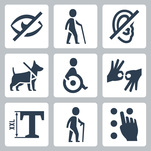Resources for College-Bound Students
Click on any link on this page to connect to more information.
We also encourage you to check out more resources at the
Clearinghouse at the National Center for College Students with Disabilities!
We also encourage you to check out more resources at the
Clearinghouse at the National Center for College Students with Disabilities!
Get Ready Academically
|
Know Yourself Well
|
Be Proud
|
Shop for Colleges
|
Think About Disability Issues
|
Find a Way to Pay for College
|





